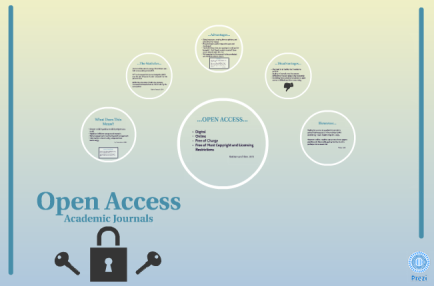Topic 5: The Swings and Roundabouts of Open Access
This topic aims to look into ‘Open Access’, the advantages and disadvantages of being able to access various materials online freely.
I have been very adventurous this week and created a Prezi Presentation (click on the image below) highlighting the effects of ‘Open Access: Academic Journals’ and a PowToon describing open access in regards to Spotify and the music industry.
Millions of academic journals are published every year, as a student it is unlikely that I will be able to read my field’s most up to date and relevant articles. This is not only due to the vast number of journals published, but also the lack of access to the majority of these articles.
I was naïve in thinking that my University had open access to all the journal articles I needed. It wasn’t until I began research on my dissertation, that I realised that the University only has access to a small proportion of the articles I required. PLOS (2015) discusses the process institutions go through in order to gain site license and re-use of its content. The video below found on Twitter, discusses the importance of open access in various organizations.
The move to create more open access journals has become more rapid since the beginning of the 21st century. In fact, the Higher Education Funding Council for England has announced that UK research after April 2016, must be open access otherwise it won’t qualify for funding (The Guardian, 2014). Some of the benefits of open access in this regard are highlighted in the video below.
However, it is not just open access to journals and other academic papers that is important. Having open access to music is also an interesting topic. However, as with academic journals, there are numerous benefits and limitations of being able to access songs online for free.
Given the various ‘swings and roundabouts’ of open access, in the coming years, as open access gains momentum, it will be interesting to see whether open accessibility is sustainable.
References:
Business Insider: UK (2014) Taylor Swift Explains Why She Left Spotify, Accessed: April 2015.
Ketchum, A. and Klem, M. (2012) Open Access Journals: The Pros and Cons, Research Methodology Series: Continuing Education, University of Pittsburgh School of Nursing.
Key Perspectives (2006) Open Access: Why Should We Have It?, Accessed: April 2015.
PLOS (2015) Open Access, Accessed: April 2015.
Right to Research (2014) The Problem: Students Can’t Access Essential Research…, Accessed: April 2015.
Spotify (2015) How is Spotify Contributing to the Music Business?, Accessed: April 2015.
The Guardian (2014) What’s the Biggest Challenge Facing Open Access?, Accessed: April 2015.

